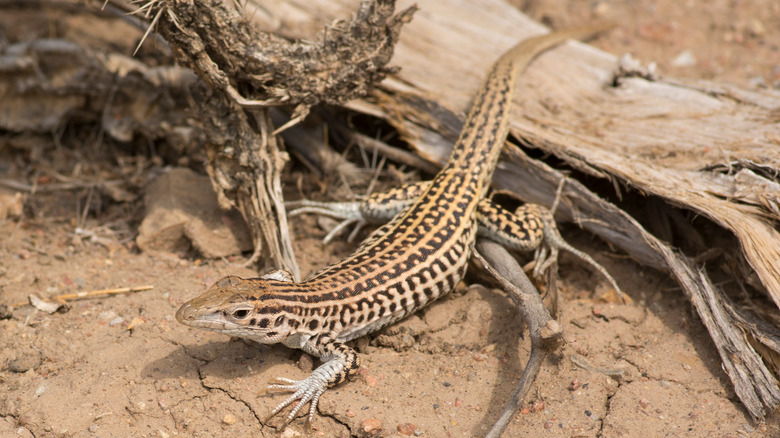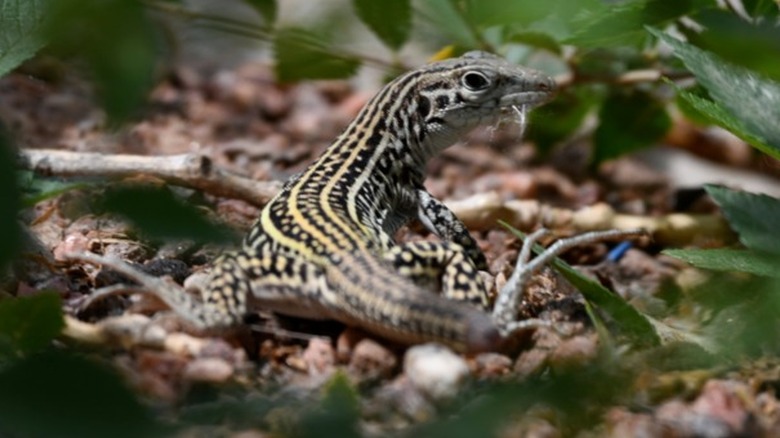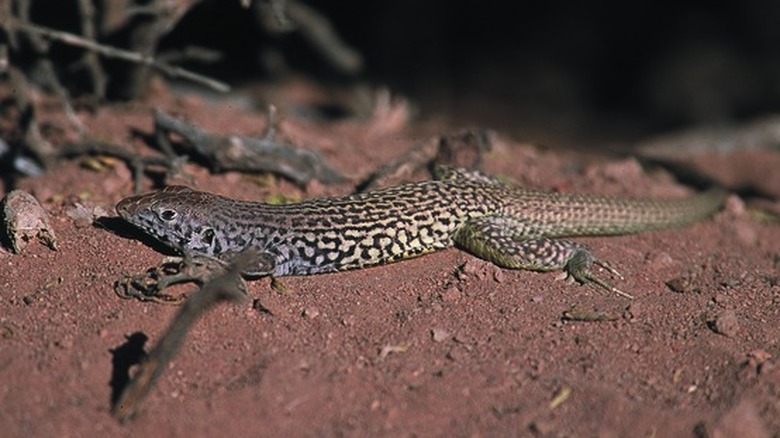US Army Flyovers Have Caused Lizards To Engage In A Very Human Behavior
Science has come a long way in understanding the negative consequences of prolonged stress on the human body. Certain individuals respond to stressful situations by over-eating, according to Mayo Clinic. A study published in 2023 in Frontiers in Amphibian and Reptile Science took a look at the possible effects of stressors on a species of lizard in the American Southwest, the Colorado checkered whiptail (pictured). The lizard's primary territory, as its name suggests, is southeast Colorado, CNN reports.
With powerful hearing, the problems these small creatures faced were not work deadlines or unpaid bills, of course, but noisy U.S. Army jet flyovers near Fort Carson Military Base in Colorado Springs, Colorado, especially in the reptile's reproductive season. Notably, Colorado checkered whiptails are all female, and reproduce asexually. What researchers found was that when over-stressed by jet flyover noise pollution, the sensitive lizards responded not unlike how some humans react when times are tough: They moved around less and ate more, which might affect their reproductive viability.
According to Pennsylvania State University biology professor Tracy Langkilde, who's worked on similar research, "Seeing something about lizards is expanding our understanding on how noise affects our native species in really important ways" (via CNN).
The lizards had elevated levels of the stress hormone cortisol
When jet flyovers took place in 2021 during the lizards' reproductive season, researchers found that Colorado checkered whiptail lizards had more cortisol in their system, a hormone linked to many of the negative health consequences of stress, according to Cleveland Clinic. They also had increased levels of ketones, another natural compound related to stress. During the study, U.S. Army jets flew over certain areas on some days, and not on others, with maximum decibel levels of around 112 decibels on the closest flyover, New Scientist writes. A total of 82 lizards were examined.
In a statement, co-lead study author Megen Kepas from Utah State University said: "Here we show that noise disturbance does have measurable physiological impacts on Colorado checkered whiptails." The research comes at a time of growing concern about noise pollution's effect on wildlife and ecosystems, per The Wildlife Habitat Council. Man-made noise has been shown to affect animal mating, systems of navigation, feeding habits, and foraging. Most research so far on the impact of noise on flora and fauna has been done on birds, making the Colorado whiptail findings especially notable, according to Pennsylvania State biology professor, Tracy Langkilde, speaking with CNN.
The lizards also stress-ate
The next time you have a big deadline at work and you find yourself consuming a whole pint of ice cream rather late at night, you may find your behavior is not so unlike the behaviors of these lizards. When stressed by loud U.S. Army jet flyovers, the Colorado checkered whiptails also over-ate, and that behavior persisted even after the noise stressor subsided. This is possibly the first time science has shown the behavior in response to man-made noise pollution.
Crucially, the lizards' excess consumption could affect whiptail breeding, study co-first author, Layne Sermersheim, also of Utah State University, added in a statement: "Compensatory eating would allow individuals to maintain their energy levels during a stressful event. This is important because metabolism, physical activity, investment into reproduction, and hormonal responses require energy."


